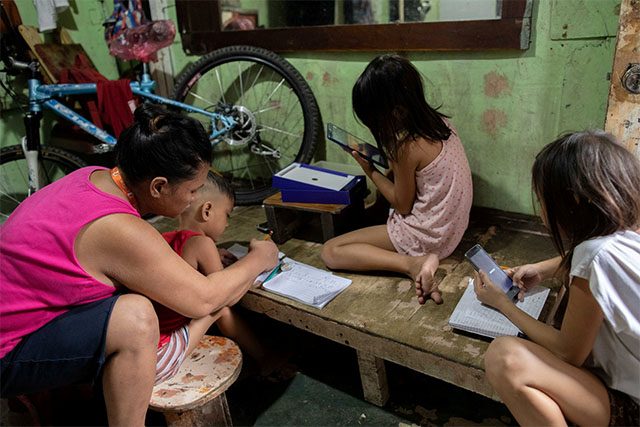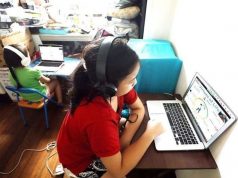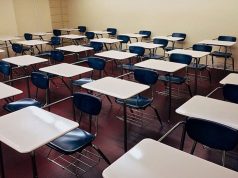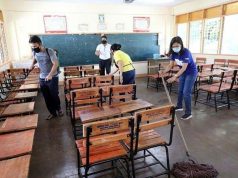
Some students and other concerned Filipinos called on the Department of Education to rethink its plan of cutting short the two-month summer break into six weeks before transitioning to another school year.
Education Undersecretary Diosdado San Antonio said they are mulling on starting the next academic year on August 23 “because there’s a pandemic.”
The current school year started on October 5 and will end on July 10.
It was initially scheduled to end in June but it was extended to give academic ease and provide students more time to complete their requirements.
“Parang 2 weeks lang naman shorter [sa] dating 2 months kasi pandemya naman. Sana hindi na siya mahirap para sa marami,” San Antonio said in an interview with ABS-CBN News on Tuesday.
He said that the decision is still not final as “there is still no DepEd order.”
In another interview on Tuesday, San Antonio said the school year “is what was approved.”
The education official said that they have already corrected their learning resources after several errors on printed modules were reported, especially last year.
“Dahil may karanasan na rin sa pagsasagawa nito (distance learning) ngayong pasukan, makakagawa na rin ang mga kasamang guro natin at mga principal ng mas mainam na paraan para ang mga bata ay hindi masyadong mahirapan,” San Antonio said.
Following San Antonio’s pronouncements, a group of educators slammed the proposal to shorten the school break. It warned that the shortened break could “prove to be counterproductive” since “it can lead to the undoing of the very backbone of education continuity.”
“While education continuity remains our top priority, DepEd must also give due consideration to the well-being of both teachers and students. The extension of the current school year is already requiring teachers to render 77 working days of overtime, without a single day of leave benefit,” Alliance of Concerned Teachers (ACT) said in a Facebook post.
It accused DepEd of pushing teachers “beyond their limits,” who are fulfilling their duties despite the limitations brought by the prevailing public health crisis.
‘Students and teachers are tired’
Students and other Filipinos likewise urged DepEd to reconsider the proposed reduced summer break and give the concerned parties a reprieve especially at the current state of the COVID-19 pandemic.
“I just wanna say, rethink that decision po, DepEd. Both students and teachers are tired from doing the new style of learning/teaching. They, we deserved a longer break than 6 weeks,” a Twitter user said in response to the reports.
“Kayo na lang mag aral ha. Kayo naman nag-mamadali,” another online user said with a series of crying face emojis.
“Teh, seryoso ba kayo teh, parang gusto niyo na ata kami patayin sa pagod,” commented a different Filipino.
Another online user appealed to have the school year moved to at least September this year.
“We need a real break,” he tweeted.
A social media user who has a teacher for a parent gave a glimpse of the learning situation on the ground.
“Try to put yourself in the shoes of a teacher. It takes you weeks to record presentations for asynchronous learning. Maybe you’re an older teacher who’s exhausted by new technology. You—and your students—all have Zoom fatigue. That’s not even factoring in if you’ve gotten sick,” she shared.
In her succeeding tweet, she posted a picture of her mother who worked while she had COVID-19.
“She didn’t want to let down her students. She eventually had to miss classes while she was hospitalized, and is only now catching up to her backlog. Please @DepEd_PH, give teachers (and students) a proper break,” the Twitter user added.
This is my mom, a teacher, working WHILE SHE HAD COVID because she didn't want to let down her students. She eventually had to miss classes while she was hospitalized, and is only now catching up to her backlog.
Please @DepEd_PH, give teachers (and students) a proper break. 😔 pic.twitter.com/46fRghi9hh
— Ceej Tantengco (@ceejtheday) April 27, 2021
Due to the pandemic, on-site classes have been called off since last year to reduce COVID-19 transmission.
Under the newly-imposed distance learning setup, students either learn online via teleconferencing and other online platforms, through printed modules or through television and radio.
Experts believe that “the stresses of the pandemic could lead to anxiety, depression, or difficulties with learning” among students.
They said that schools needed to focus on the students’ emotional needs in order to help them cope with the situation.
The Department of Health previously warned parents of potential health problems that students may face amid distance learning at a time of a pandemic.
“With online classes, there could be increasing feelings of isolation due to lack of face-to-face interaction,” the health agency said in a statement last year.
“Students may experience health concerns related to increased screen time, such as fatigue, headache, lack of motivation, avoidance/procrastination, among others,” DOH added.
“Practice self-care, self-compassion, and self-awareness of their thoughts and feelings,” it further said.









